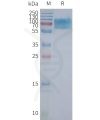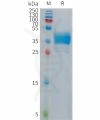CHRM2 recombinant proteins and antibodies
Muscarinic acetylcholine receptor M2 (CHRM2), also known as ACM2, is a G protein-coupled receptor (GPCR) that belongs to the muscarinic acetylcholine receptor family. This receptor is widely distributed in the heart, brain, and other nervous system tissues, playing a crucial physiological role, especially in the heart and central nervous system. CHRM2, by binding with acetylcholine, activates a series of intracellular signaling pathways that regulate heart rhythm, neurotransmitter release, and neural transmission. Specifically, in the heart, CHRM2 regulates heart rate and force of contraction through negative inotropic effects (inhibiting myocardial contraction). In the central nervous system, CHRM2 modulates the release of neurotransmitters, especially playing a critical role in the balance of dopamine and other important neurotransmitters. Therefore, CHRM2 is considered a potential target for a range of diseases, particularly in cardiovascular diseases, neuropsychiatric disorders, and neurodegenerative diseases.
CHRM2’s role in cardiovascular diseases is particularly important. Studies have shown that its negative inotropic effects in the heart can be used to treat conditions associated with excessive cardiac excitation, such as arrhythmias. Additionally, CHRM2’s function in the nervous system makes it a promising target for treating certain neuropsychiatric disorders, particularly schizophrenia, anxiety disorders, and depression. Research has also found that CHRM2’s interaction with the dopamine system could play a role in addictive behaviors and neurodegenerative diseases, such as Alzheimer’s disease.
Currently, drug development targeting CHRM2 is primarily focused on treating cardiovascular diseases and neurological disorders. Several biopharmaceutical companies are conducting research into CHRM2-based therapies. For example, companies like Apexigen and Amgen are exploring drugs that modulate CHRM2’s actions in the heart and nervous system to improve arrhythmias, depression, and other neuropsychiatric conditions. Furthermore, CHRM2 antagonists are also being investigated for treating diseases caused by excessive CHRM2 activity, such as arrhythmias or certain disorders characterized by excessive neural excitability. With continued research into the mechanisms of CHRM2, it is expected that more innovative drugs will enter clinical trials in the future, providing additional treatment options for cardiovascular diseases and neuropsychiatric disorders.
To assist in the development of CHRM2-targeted drugs, DIMA BIOTECH can now provide full-length CHRM2 recombinant membrane protein developed by its nanodisc membrane protein platform. CHRM2 nanodisc is an optimal solution for screening small molecules targeting FSHR with its natural structure. Furthermore, DIMA BIOTECH has also prepared a CHRM2 single B cell seed library, from which lead antibody molecules can be obtained in as fast as 28 days.
Full Length Transmembrane Proteins
SKU: FLP100111 Target: CHRM2 Tag: C-Flag Tag
Price: 10 μg $900.00 ; 50 μg $4400.00 ; 100 μg $8000.00
ECD Proteins
SKU: PME101282 Target: CHRM2 Tag: C-Human Fc Tag
Price: 10μg $70.00; 50μg $244.00 ; 100μg $367.00
Full Length Transmembrane Proteins
SKU: FLP120111 Target: CHRM2 Tag: C-Flag&Strep Tag
Price: 10 μg $810.00 ; 50 μg $3960.00 ; 100 μg $7200.00



